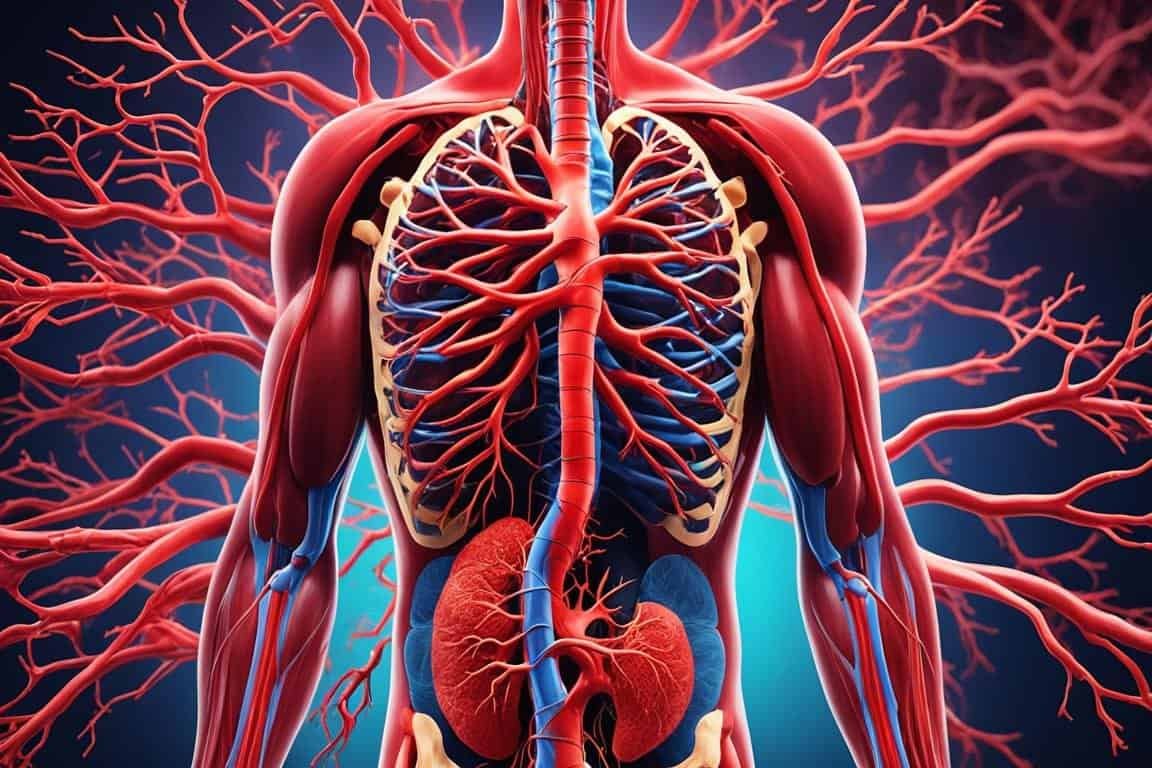Welcome to your comprehensive guide to understanding cholesterol and inflammation, two crucial factors in maintaining optimal health. Cholesterol, a fatty substance in the blood, plays a significant role in our overall well-being. However, high cholesterol levels can lead to artery clogs and increase the risk of heart disease, heart attack, and stroke. Additionally, chronic inflammation can further exacerbate cholesterol-related health issues.
It is essential to manage cholesterol levels and reduce inflammation through diet and lifestyle choices. With the right knowledge and action, you can make informed decisions that positively impact your cardiovascular health. In this guide, we will explore the link between cholesterol and inflammation, understand the role of lifestyle choices in managing cholesterol, and delve into the accurate measurement and treatment options available for controlling cholesterol levels.
Together, let’s embark on this journey to better health by empowering ourselves with the knowledge and tools necessary to make informed decisions about our well-being.
Key Takeaways
- Cholesterol is a fatty substance in the blood that can increase the risk of heart disease if levels are too high.
- Chronic inflammation can impact cholesterol levels and contribute to inflammation-related diseases.
- A balanced diet, regular exercise, and stress management play crucial roles in managing cholesterol levels.
- Accurate measurement of LDL cholesterol is essential for assessing cardiovascular disease risk and determining appropriate treatment options.
- Imaging tests, like the coronary artery calcium scan, can help assess cholesterol-related risks and guide treatment plans.
Understanding Cholesterol and its Impact on Health
Cholesterol is a natural component in the blood that plays essential roles in the body. However, excessive LDL cholesterol can lead to the accumulation of plaque in the arteries, increasing the risk of heart disease, heart attack, and stroke. On the other hand, HDL cholesterol helps remove cholesterol from the arteries, promoting cardiovascular health.
Consuming foods high in saturated fats and trans fats, such as red meat, full-fat dairy products, and processed foods, can raise LDL cholesterol levels. These types of fats can contribute to the formation of artery clogs, which can obstruct blood flow and put strain on the heart.
| Cholesterol Type | Function | Impact on Health |
|---|---|---|
| LDL Cholesterol | Transports cholesterol to cells | When levels are high, it can lead to artery clogs and increase the risk of heart disease, heart attack, and stroke |
| HDL Cholesterol | Removes cholesterol from the arteries and transports it back to the liver | Higher levels are associated with a lower risk of heart disease |
In addition to dietary factors, chronic inflammation can also impact cholesterol levels. Factors such as pregnancy, stress, diabetes, and certain inflammatory diseases can contribute to inflammation in the body, influencing cholesterol levels. It is important to understand the role of inflammation and its connection to cholesterol to effectively manage and maintain optimal health.
Understanding cholesterol levels and their impact on health is crucial. By implementing healthy lifestyle choices, such as consuming a balanced diet, exercising regularly, managing stress, and seeking appropriate medical care, you can effectively manage LDL cholesterol levels and promote overall cardiovascular health. Remember, a proactive approach towards cholesterol management is key to reducing the risk of heart disease, heart attack, and stroke.
The Importance of Lifestyle Choices in Managing Cholesterol
Lifestyle choices and habits play a crucial role in managing cholesterol levels. By making conscious decisions and adopting healthy practices, you can effectively manage your cholesterol and promote overall well-being. Here are some key factors to consider:
- 1. Diet: A balanced diet is essential for cholesterol management. Incorporate cholesterol-lowering foods into your meals, such as fruits, vegetables, whole grains, and foods rich in monounsaturated fats (e.g., nuts and olive oil) and polyunsaturated fats (e.g., fish and canola oil). These foods not only help manage cholesterol but also provide essential nutrients for your body.
- 2. Weight Management: Avoiding weight gain is crucial for maintaining healthy cholesterol levels. Excess weight can lead to increased LDL cholesterol while lowering HDL cholesterol, putting you at a higher risk of heart disease. Regular exercise and portion control can help you achieve and maintain a healthy weight.
- 3. Stress Management: Chronic stress can impact cholesterol levels and overall cardiovascular health. Engaging in stress management techniques, such as meditation, yoga, and deep breathing exercises, can help reduce stress and promote healthier cholesterol levels.
- 4. Regular Exercise: Lack of physical activity can contribute to higher LDL cholesterol levels and lower HDL cholesterol levels. Incorporate regular exercise into your routine, aiming for at least 30 minutes of moderate-intensity exercise most days of the week. This can include activities like brisk walking, cycling, or swimming.
Adopting these lifestyle choices not only helps in cholesterol management but also contributes to reducing inflammation in the body. Reduced inflammation plays a crucial role in preventing various chronic diseases and promoting overall health.

| The Importance of Lifestyle Choices | Key Actions |
|---|---|
| Diet | Eat a balanced diet rich in cholesterol-lowering foods like fruits, vegetables, whole grains, and healthy fats. |
| Weight Management | Avoid weight gain and adopt regular exercise to maintain a healthy weight. |
| Stress Management | Practice stress-reducing techniques like meditation, yoga, or deep breathing exercises. |
| Regular Exercise | Incorporate at least 30 minutes of moderate-intensity exercise into your daily routine. |
The Link Between Chronic Inflammation and Cholesterol
Chronic inflammation in the body can have a significant impact on your cholesterol levels. While inflammation is a natural immune response to injury or disease, chronic inflammation can be detrimental to your cholesterol levels and overall health. Factors such as pregnancy, high levels of stress, diabetes, and various inflammatory diseases can contribute to increased inflammation in the body. As a result, this can lower your levels of HDL cholesterol, commonly known as “good” cholesterol, and raise your levels of LDL cholesterol, known as “bad” cholesterol.
Inflammation triggers the release of chemicals in the body that can alter how cholesterol is transported and metabolized. This disruption can lead to an imbalance in cholesterol levels, increasing the risk of cardiovascular problems. If you have chronic inflammation, it is crucial to understand the link between inflammation and cholesterol to effectively manage and prevent potential health risks.
To illustrate this connection between chronic inflammation and cholesterol, consider the following:
- Inflammatory diseases like rheumatoid arthritis and lupus can significantly impact cholesterol levels. The chronic inflammation associated with these conditions can lead to increased levels of LDL cholesterol, which may contribute to the development of cardiovascular disease.
- Pregnancy is a physiological state that involves increased levels of inflammation. These elevated inflammation levels can affect cholesterol metabolism, leading to unfavorable changes in LDL and HDL cholesterol levels.
- Stress, whether acute or chronic, can trigger inflammatory responses in the body. Persistent stress can contribute to an overactive immune system, resulting in chronic inflammation and an imbalance in cholesterol levels.
- Diabetes is a metabolic disorder characterized by high blood sugar levels. It is also associated with chronic inflammation and can impact cholesterol levels. Diabetes can lower HDL cholesterol and increase LDL cholesterol, increasing the risk of heart disease.
By recognizing and addressing the link between chronic inflammation and cholesterol, you can take steps to manage your cholesterol levels effectively. Making lifestyle changes such as adopting an anti-inflammatory diet, managing stress levels, engaging in regular exercise, and seeking appropriate medical guidance can help mitigate the impact of chronic inflammation on your cholesterol levels.
Accurate Measurement of LDL Cholesterol and Treatment Options
Accurately measuring LDL cholesterol levels is vital for assessing your risk of cardiovascular disease and determining the most appropriate treatment options. While the traditional calculation method provides a general estimate, it may underestimate the risk for certain individuals. That’s why a more individualized and accurate assessment is necessary to fully understand your cholesterol profile and the potential risks it poses.
In addition to precise measurement, managing LDL cholesterol levels requires a multi-faceted approach that combines both lifestyle changes and medication. Making simple yet impactful lifestyle changes can significantly impact your cholesterol levels. Adopting a cholesterol-friendly diet, rich in fruits, vegetables, whole grains, and lean proteins, can help lower LDL cholesterol levels. Incorporating regular exercise into your routine, such as brisk walking or cycling, can also contribute to cholesterol management and overall cardiovascular health.
Managing LDL cholesterol levels may also involve medication, particularly in cases where lifestyle changes alone are not sufficient. Medications like statins have been extensively studied and shown to be highly effective in reducing LDL cholesterol levels. These medications work by blocking a specific enzyme in the liver that is responsible for cholesterol production. By reducing LDL cholesterol levels, statins help lower the risk of cardiovascular events, such as heart attacks and strokes.
Note: Medications should always be prescribed by a qualified healthcare professional after a thorough risk assessment and discussion of individual needs.
Recent guidelines provide a framework for effectively assessing and addressing high LDL cholesterol, enabling healthcare providers to tailor treatment options specifically to each person’s unique needs. By combining accurate measurement, lifestyle changes, and appropriate medications, you can effectively manage LDL cholesterol and significantly reduce the risk of cardiovascular disease.
| Treatment Options for Managing LDL Cholesterol | Description |
|---|---|
| Lifestyle Changes | Adopting a cholesterol-friendly diet and engaging in regular exercise. |
| Medication | Prescription medications, such as statins, to reduce LDL cholesterol levels. |

The Role of Imaging Tests in Assessing Cholesterol-related Risk
Imaging tests play a crucial role in assessing the impact of cholesterol on your risk for heart disease. One such test is the coronary artery calcium scan, a non-invasive procedure that uses computerized tomography (CT) technology to detect the presence of calcium and plaque buildup in the arteries of your heart. This scan provides valuable insights into the condition of your arteries and helps evaluate the extent of plaque accumulation.
By identifying the presence of heart disease early on, before any symptoms occur, you and your healthcare provider can take proactive measures to address the associated risks and develop a tailored treatment plan. The coronary artery calcium scan enables a thorough assessment of your cholesterol-related risks, helping guide appropriate interventions to mitigate the progression of heart disease.
It is important to note that the coronary artery calcium scan specifically targets plaque buildup in the arteries, offering a direct measurement of atherosclerosis. This scan provides valuable information that complements traditional risk assessments, such as cholesterol levels and blood pressure measurements, enhancing your overall risk evaluation for heart disease.
Consult with your healthcare provider to determine whether a coronary artery calcium scan is suitable for you. Together, you can explore the potential benefits and risks associated with the procedure and make an informed decision regarding your heart health.
Conclusion
Managing your cholesterol levels and reducing inflammation are vital for maintaining optimal cardiovascular health. By understanding the impact of cholesterol on your body, the factors that influence cholesterol levels, and the role of chronic inflammation, you can make informed lifestyle choices to protect your heart.
Achieving healthy cholesterol levels starts with adopting a cholesterol-friendly diet. Opt for foods rich in fruits, vegetables, whole grains, and healthy fats like nuts and olive oil. Additionally, regular physical activity and stress management play a crucial role in maintaining healthy cholesterol levels and reducing the risk of heart disease, heart attack, and stroke.
Remember, lifestyle choices alone may not always be enough to manage cholesterol levels. In some cases, medical interventions may be necessary. Collaborate with your healthcare provider to develop an individualized plan that may include cholesterol-lowering medications and regular check-ups to monitor your progress.
By prioritizing cholesterol and inflammation management, making informed lifestyle choices, and seeking appropriate medical guidance, you can take control of your cardiovascular health, lead a healthier life, and improve your overall well-being. Your heart deserves the best care, and you have the power to make a positive impact on your cardiovascular health.

